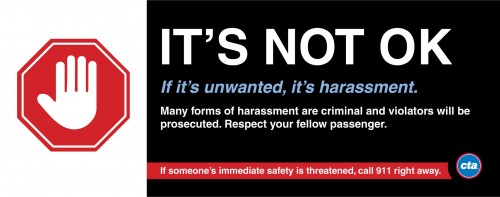
The familiar song of the Red Line sings, “This is Roosevelt” and invites DePaul junior Shelby Trkla and her sister onto the train. They travel north to Fullerton, and sit next to each other on the stained blue seats. Strangers board the train and a young woman sits across from them. A stop later at Harrison, a man enters the train and sits down next to her. She does not know him. She ignores him. He calls her derogatory names, such as “bitch” and “slut.”
Everyone, including the Trkla sisters, witnessed this harassment.
Everyone felt threatened by this man.
No one spoke up.
The CTA’s new “Anti-Harassment Campaign, which began Oct. 9, attempts to combat the harassment like Shelby Trkla witnessed on CTA transportation.
Many new ads have been placed on trains and buses that say, “If it’s unwanted, it’s harassment.” The goal of this campaign is to promote awareness that CTA will not tolerate harassment on its trains, buses or other CTA property, and provide helpful information to customers who believe they are the victims of harassment, according to Terry Peterson, Chicago Transit Board Chairman and Dorbal R. Carter, Jr., Chicago Transit Authority President.
The campaign encourages passengers to speak up and has a website offering advice on how to handle harassment on the CTA. The website provides answers to frequently asked questions, such as, “What is considered sexual harassment?”
CTA harassment incidents reported this year.
There have been 37 reports of assault on CTA platforms this year, in comparison to 49 reported assaults in 2014, based off of data from the City of Chicago Data Portal.
Some people, like DePaul freshman Karlie Thornton, do not think that the ads will stop harassers on the CTA.
“Ads and online test are not going to change people,” Thornton said. “I feel like an experience, intervention, or human interaction will have something to do with it and with ads and campaigns, they’re going to look at it and still do what they do.”
However, Trkla said the campaign may have some affect on harassers.
“It might help a little bit, but people get harassed all the time,” Trkla said. “I am not saying it will work, but it could help.”
The young woman whose harassment Trkla witnessed on her commute felt so uncomfortable that she got off at the next stop.
“Too many people were too scared to intervene,” Trkla said.

